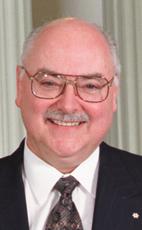To confirm this, I am extremely pleased to report to the House that this evening—
 House of Commons photo
House of Commons photoWon his last election, in 1997, with 54% of the vote.
Division No. 358 March 23rd, 1999
To confirm this, I am extremely pleased to report to the House that this evening—
Division No. 358 March 23rd, 1999
moved that Bill C-76, an act to provide for the resumption and continuation of government services, be read the second time and referred to committee of the whole.
Mr. Speaker, I rise to introduce the bill to provide for the resumption and continuation of government services. But I would first like to say that the government's calls to reason have been heard.
I am extremely pleased to inform the House that the joint efforts of our negotiators and those of the Public Service Alliance of Canada have resulted this evening in an agreement in principle for the 14,000 blue collar workers—
Division No. 360 March 23rd, 1999
moved that the bill, as amended, be read the third time and passed.
Mr. Speaker, I will not make a speech. I would like to thank all the people in the House, especially those from my party who have gone through the night in order to support it. Thank you very much.
Division No. 359 March 23rd, 1999
moved that the bill, as amended, be concurred in.
Division No. 359 March 23rd, 1999
I have understood what the member has said.
Division No. 359 March 23rd, 1999
Mr. Chairman, my colleague is of course referring to the fact that federal MPs are all paid the same no matter where they come from. What I said earlier was that members of provincial parliaments receive different salaries. This can be proved. You only have to look at the difference between the salaries of MPs in Newfoundland, for instance, and Ontario. That is what I said.
Regarding regional rates of pay, I said that equity involves adapting to local circumstances and the local cost of living. That is what we are doing.
If we look at the case of the blue collar workers, the Atlantic region benefits enormously under the agreement we have now.
Division No. 359 March 23rd, 1999
Mr. Chairman, I am told there was an emergency in these two institutions where these 300 people were. That emergency was solved for these two situations. However, the rest of the problem remained. Once again that is why we have to have back to work legislation for these essential services.
Division No. 359 March 23rd, 1999
Mr. Chairman, the answer is easy. Before that agreement was made, there were 900 people in that situation. That agreement solved it for 300, but unfortunately it did not solve it for the 500 to 600 that were left. For these 500 and 600 we still have the need for back to work legislation.
Division No. 359 March 23rd, 1999
Mr. Chairman, the member unfortunately will get the same answer because I do not know of any other answer to his question.
The four elements in the conciliation report are training, parity or not with the RCMP, a step taken off the bottom and a step added at the top.
The member is right when he says there has been a prescription for arbitration twice: one in the last budget for the reason I gave and one in the budget at the time we imposed restrictions. At that point we indicated that we wanted to be responsible for the settlements and did not want a referee to be responsible for them.
Division No. 359 March 23rd, 1999
Mr. Chairman, I underline the fact that we have been able to negotiate collective agreements with our members in more than 87% of the cases. However I will consider the possibilities my hon. colleague mentioned.